
Richard Nathaniel Wright was an American author of novels, short stories, poems, and non-fiction. Much of his literature concerns racial themes, especially related to the plight of African Americans during the late 19th to mid 20th centuries suffering discrimination and violence. His best known works include the novella collection Uncle Tom's Children (1938), the novel Native Son (1940), and the memoir Black Boy (1945). Literary critics believe his work helped change race relations in the United States in the mid-20th century.
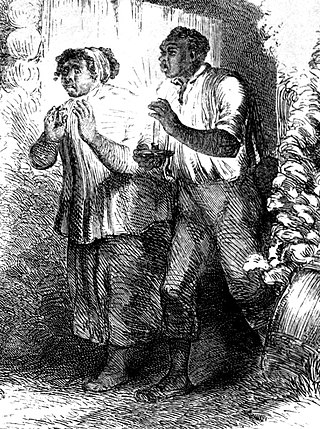
Uncle Tom is the title character of Harriet Beecher Stowe's 1852 novel Uncle Tom's Cabin. The character was seen in the Victorian era as a ground-breaking literary attack against the dehumanization of slaves. Tom is a deeply religious Christian preacher to his fellow slaves who uses nonresistance, but who is willingly flogged to death rather than violate the plantation's code of silence by informing against the route being used by two women who have just escaped from slavery. However, the character also came to be criticized for allegedly being inexplicably kind to white slaveowners, especially based on his portrayal in pro-compassion dramatizations. This led to the use of Uncle Tom – sometimes shortened to just a Tom – as a derogatory epithet for an exceedingly subservient person or house negro, particularly one accepting and uncritical of his or her own lower-class status.

Native Son (1940) is a novel written by the American author Richard Wright. It tells the story of 20-year-old Bigger Thomas, a black youth living in utter poverty in a poor area on Chicago's South Side in the 1930s. Thomas accidentally kills a white woman at a time when racism is at its peak and he pays the price for it.

James Arthur Baldwin was an African American writer and civil rights activist who garnered acclaim for his essays, novels, plays, and poems. His 1953 novel Go Tell It on the Mountain has been ranked by Time magazine as one of the top 100 English-language novels. His 1955 essay collection Notes of a Native Son helped establish his reputation as a voice for human equality. Baldwin was an influential public figure and orator, especially during the civil rights movement in the United States.
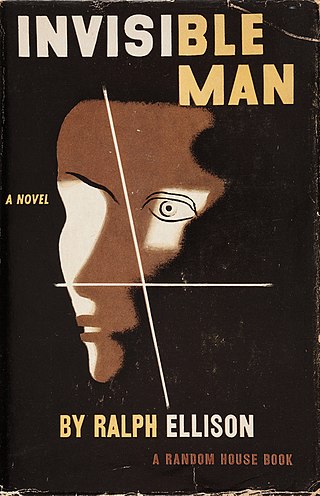
Invisible Man is Ralph Ellison's first novel, the only one published during his lifetime. It was published by Random House in 1952, and addresses many of the social and intellectual issues faced by African Americans in the early 20th century, including black nationalism, the relationship between black identity and Marxism, and the reformist racial policies of Booker T. Washington, as well as issues of individuality and personal identity.
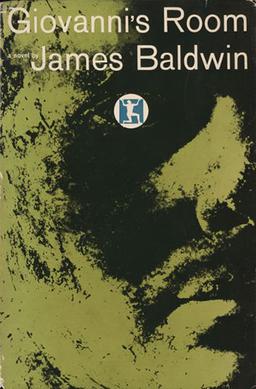
Giovanni's Room is a 1956 novel by James Baldwin. The book concerns the events in the life of an American man living in Paris and his feelings and frustrations with his relationships with other men in his life, particularly an Italian bartender named Giovanni whom he meets at a Parisian gay bar. While he deals with his difficulties with men, he is engaged to an American woman who is travelling in Spain.
African American literature is the body of literature produced in the United States by writers of African descent. Olaudah Equiano was an African man who wrote The Interesting Narrative of the Life of Olaudah Equiano, an autobiography published in 1789 that became one of the first influential works about the transatlantic slave trade and the experiences of enslaved Africans. His work was published sixteen years after Phillis Wheatley's work. She was an enslaved African woman who became the first African American to publish a book of poetry, which was published in 1773. Her collection, was titled Poems on Various Subjects, Religious and Moral.
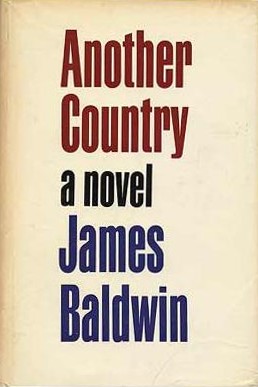
Another Country is a 1962 novel by James Baldwin. The novel is primarily set in Greenwich Village, Harlem, and France in the late 1950s. It portrayed many themes that were taboo at the time of its release, including homosexuality, bisexuality, interracial couples, and extramarital affairs.

The Fire Next Time is a 1963 non-fiction book by James Baldwin, containing two essays: "My Dungeon Shook: Letter to my Nephew on the One Hundredth Anniversary of the Emancipation" and "Down at the Cross: Letter from a Region of My Mind".

Notes of a Native Son is a collection of ten essays by James Baldwin, published in 1955, mostly tackling issues of race in America and Europe.
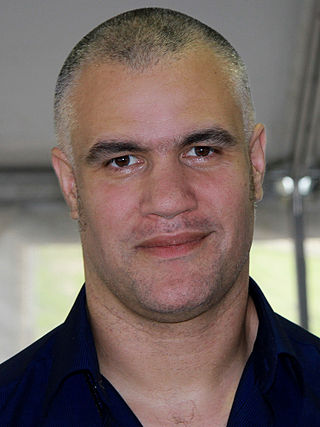
Mat Johnson is an American fiction writer who works in both prose and the comics format. In 2007, he was named the first USA James Baldwin Fellow by United States Artists.
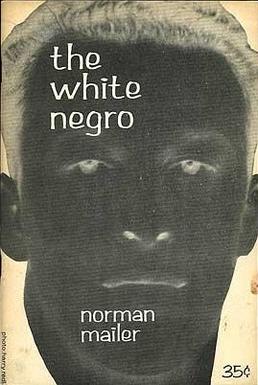
The White Negro: Superficial Reflections on the Hipster is a 9,000-word essay by Norman Mailer that connects the "psychic havoc" wrought by the Holocaust and atomic bomb to the aftermath of slavery in America in the figuration of the Hipster, or the "white negro". The essay is a call to abandon Eisenhower liberalism and a numbing culture of conformity and psychoanalysis in favor of the rebelliousness, personal violence and emancipating sexuality that Mailer associates with marginalized black culture. The White Negro was first published in the 1957 special issue of Dissent, before being published separately by City Lights. Mailer's essay was controversial upon its release and received a mixed reception, winning praise, for example, from Eldridge Cleaver and criticism from James Baldwin, Ralph Ellison, and Allen Ginsberg. Baldwin, in particular, heavily criticized the work, asserting that it perpetuated the notorious "myth of the sexuality of Negros" and stating that it was beneath Mailer's talents. The work remains his most famous and most reprinted essay and it established Mailer's reputation as a "philosopher of hip".
"Stranger in the Village" is an essay by African-American novelist James Baldwin about his experiences in Leukerbad, Switzerland, after he nearly suffered a breakdown. The essay was originally published in Harper's Magazine, October 1953, and later in his 1955 collection, Notes of a Native Son.
Revolutionary Integrationism is an analysis, philosophy, and program for resolving the "black question"—the problem of the oppression of blacks, and their liberation—in the United States.

"Nobody Knows the Trouble I've Seen" is an African-American spiritual song that originated during the period of slavery but was not published until 1867. The song is well known and many cover versions of it have been recorded by artists such as Marian Anderson, Lena Horne, Louis Armstrong, Harry James, Paul Robeson, and Sam Cooke among others.
A race riot took place in Harlem, New York City, on August 1 and 2 of 1943, after a white police officer, James Collins, shot and wounded Robert Bandy, an African American soldier; and rumors circulated that the soldier had been killed. The riot was chiefly directed by Black residents against white-owned property in Harlem. It was one of five riots in the nation that year related to Black and white tensions during World War II. The others took place in Detroit; Beaumont, Texas; Mobile, Alabama; and Los Angeles.

Nobody Knows My Name: More Notes of a Native Son is a collection of essays, published by Dial Press in July 1961, by American author James Baldwin. Like Baldwin's first collection, Notes of a Native Son, it includes revised versions of several of his previously published essays, as well as new material.
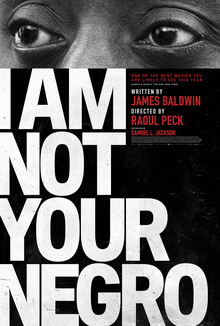
I Am Not Your Negro is a 2016 German-American documentary film and social critique film essay directed by Raoul Peck, based on James Baldwin's unfinished manuscript Remember This House. Narrated by actor Samuel L. Jackson, the film explores the history of racism in the United States through Baldwin's recollections of civil rights leaders Medgar Evers, Malcolm X and Martin Luther King Jr., as well as his personal observations of American history. It was nominated for Best Documentary Feature at the 89th Academy Awards and won the BAFTA Award for Best Documentary.
"Negroes Are Anti-Semitic Because They're Anti-White" was a landmark 1967 essay written by American writer James Baldwin that first appeared in the Sunday magazine edition of The New York Times, describing the tensions that existed in African American–Jewish relation.
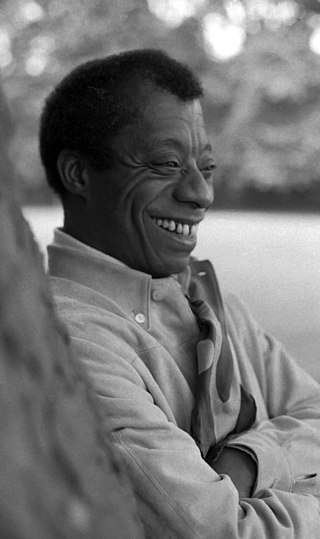
James Baldwin (1924–1987) was born in and lived his entire childhood and adolescence in Harlem, New York. He expatriated and lived most of his adult life in France, though he traveled frequently and had extended stays in other countries. He lived in Paris for nine years and in Saint-Paul-de-Vence for 17 years. France and his other stays abroad provided him with a vantage point for observing his own American culture, which was the main subject of his work.











